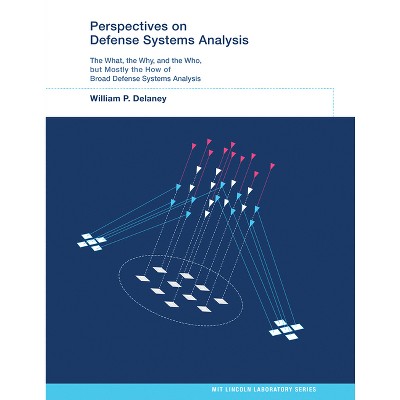Sponsored

Net Energy Analysis and the Energy Requirements of Energy Systems - by Daniel Spreng (Hardcover)
In Stock
Sponsored
About this item
Highlights
- With rising energy costs and the threat of diminishing resources affecting all international economies, the computation of energy required to extract and refine a resource--net energy analysis--has become an important component of energy analysis.
- About the Author: DANIEL T. SPRENG is associated with the Swiss Federal Institute of Technology in Zurich, Switzerland, where he teaches and conducts research in energy analysis.
- 306 Pages
- Technology, Mechanical
Description
About the Book
With rising energy costs and the threat of diminishing resources affecting all international economies, the computation of energy required to extract and refine a resource--net energy analysis--has become an important component of energy analysis. This volume fills a major gap in the energy development literature by providing a full-length scholarly treatment of the subject. Written for energy researchers and managers in industries and utilities, Net Energy Analysis thoroughly explains the theoretical principles underlyiing net energy analysis, offers examples of how these principles are applied, and provides an impartial critique of current methods.
Book Synopsis
With rising energy costs and the threat of diminishing resources affecting all international economies, the computation of energy required to extract and refine a resource--net energy analysis--has become an important component of energy analysis. This volume fills a major gap in the energy development literature by providing a full-length scholarly treatment of the subject. Written for energy researchers and managers in industries and utilities, Net Energy Analysis thoroughly explains the theoretical principles underlyiing net energy analysis, offers examples of how these principles are applied, and provides an impartial critique of current methods.Review Quotes
?There were good things about the energy crisis of 1973--a sense of shared purpose, that any action that saved energy also benefited the environment, and that anything that saved energy really did. In time, we found that many of our strategies were not cost-effective and that others did not in fact lead to a reduction in total energy consumption. The energy investment exceeded the yield. Happily awash (again) in cheap oil, we forget the admonition reformulated by Spreng: Every unintelligent, unorganized economic activity of large volume and high speed irreversibly deprives us of natural, cultural, and economic endowments that we cannot afford to lose in the long run.' Spreng brings an excellent background to his examination of the ways in which strategies for energy conservation are evaluated. Despite a scholarly chapter on thermodynamics, this is an economics monograph. It looks at several models for evaluation of energy conservation strategies and compares their results. The book is authoritative and reads well--even in an economy airliner seat. At one time, it provides an introduction to the field and a summation for those familiar with the literature.?-Choice
?With rising energy costs and the threat of diminishing resources affecting all international economies, the computation of energy required to extract and refine a resource--net-energy analysis--has become an important component of energy analysis. Written for energy researchers and managers, this volume provides a full-length scholarly treatment of net-energy analysis, thoroughly explaining the theoretical principles underlying net-energy analysis, offering examples of how these principles are applied, and providing an impartial critique of current methods. Topic headings include: Energy Systems, Valuations of Energy, Methods of Cumulative Energy Accounting, Energy Accounting of Energy Carriers, and Energy Accounting of Energy Services.?-Energy Books Quarterly
"With rising energy costs and the threat of diminishing resources affecting all international economies, the computation of energy required to extract and refine a resource--net-energy analysis--has become an important component of energy analysis. Written for energy researchers and managers, this volume provides a full-length scholarly treatment of net-energy analysis, thoroughly explaining the theoretical principles underlying net-energy analysis, offering examples of how these principles are applied, and providing an impartial critique of current methods. Topic headings include: Energy Systems, Valuations of Energy, Methods of Cumulative Energy Accounting, Energy Accounting of Energy Carriers, and Energy Accounting of Energy Services."-Energy Books Quarterly
"There were good things about the energy crisis of 1973--a sense of shared purpose, that any action that saved energy also benefited the environment, and that anything that saved energy really did. In time, we found that many of our strategies were not cost-effective and that others did not in fact lead to a reduction in total energy consumption. The energy investment exceeded the yield. Happily awash (again) in cheap oil, we forget the admonition reformulated by Spreng: Every unintelligent, unorganized economic activity of large volume and high speed irreversibly deprives us of natural, cultural, and economic endowments that we cannot afford to lose in the long run.' Spreng brings an excellent background to his examination of the ways in which strategies for energy conservation are evaluated. Despite a scholarly chapter on thermodynamics, this is an economics monograph. It looks at several models for evaluation of energy conservation strategies and compares their results. The book is authoritative and reads well--even in an economy airliner seat. At one time, it provides an introduction to the field and a summation for those familiar with the literature."-Choice
About the Author
DANIEL T. SPRENG is associated with the Swiss Federal Institute of Technology in Zurich, Switzerland, where he teaches and conducts research in energy analysis.

















